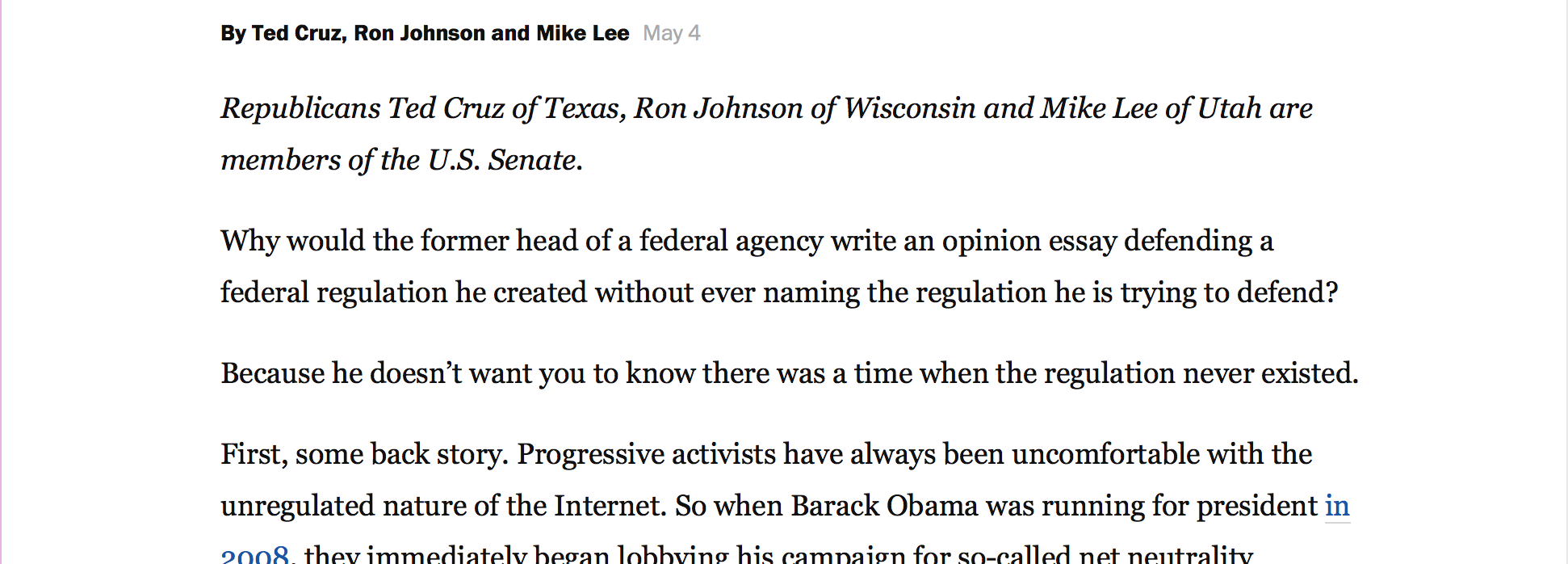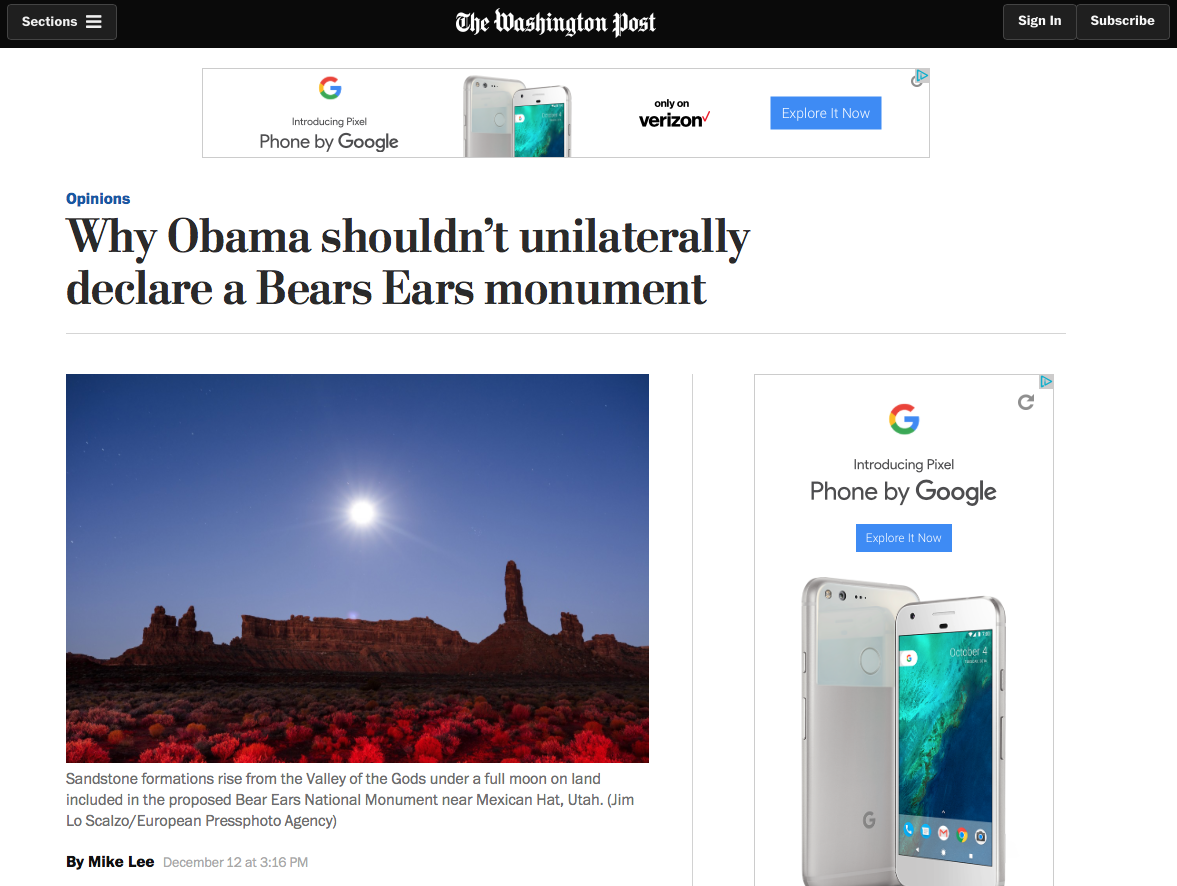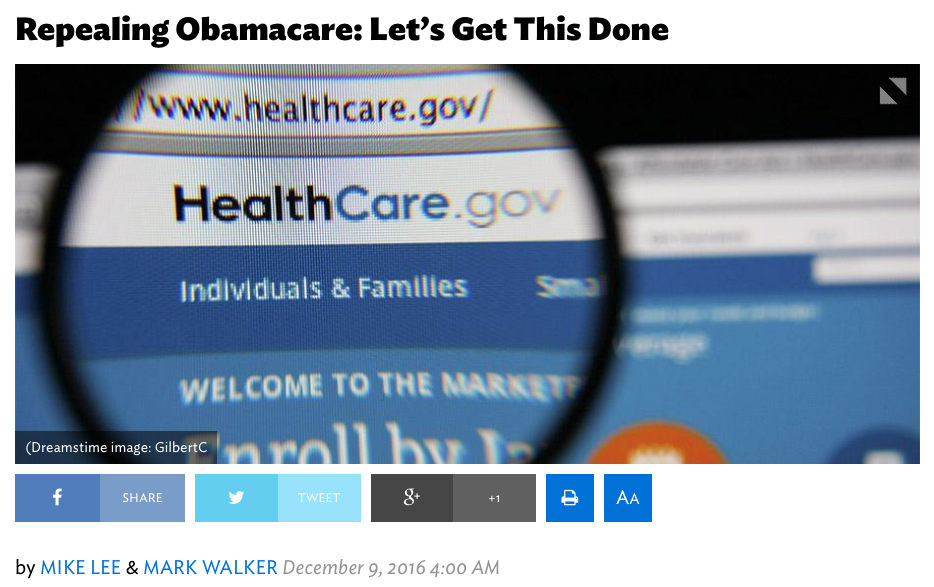What We Do Together
May 15, 2017
And yet, despite this real progress, there is a disorienting sense that our social fabric is frayed. We are wealthier in material terms than ever before, but leading thinkers have issued warnings that we are increasingly “bowling alone,” “coming apart” and inhabiting a “fractured republic.”
Get government out of the Internet’s business
May 4, 2017

Why would the former head of a federal agency write an opinion essay defending a federal regulation he created without ever naming the regulation he is trying to defend?
Because he doesn’t want you to know there was a time when the regulation never existed.
Sen. Mike Lee: Don't give up on health care
Mar 30, 2017

When I was first elected to the Senate in 2010, I ran on a promise to repeal Obamacare.
When I ran for re-election last year, I again ran on a promise to repeal Obamacare.
For more than six years, I’ve made finding a way to make health care more affordable for Utahns my top priority as a United States senator.
Make Trade Policy Accountable Again
Jan 23, 2017
Almost one year ago, long before either of our nation’s political parties had settled on a presidential nominee, I joined several conservative colleagues in the House and Senate to launch the Article I Project, a bicameral network of lawmakers working together to reclaim Congress’ constitutional powers that today are being improperly exercised by the Executive Branch.
How Congress And Trump Can Reform Taxes To Put America First
Jan 23, 2017
"The bottom line is that federal tax policy, like all federal policy, should serve the interests of the American people, and especially struggling families and communities currently being left behind"
Why Obama shouldn’t unilaterally declare a Bears Ears monument
Dec 13, 2016

The administration recently blocked the Dakota Access Pipeline due to strong opposition from local residents. I urge it to give the same respect to the residents of San Juan County, Utah. They do not want this monument. They do not want outside interests from coastal urban areas dictating to them how to live their lives and manage their lands.
Repealing Obamacare: Let’s Get This Done
Dec 9, 2016

Since 2010 everyone in the Republican party has agreed that Obamacare must be repealed. Most Republican members of Congress — ourselves included — were elected, and reelected, on the promise that we would take any opportunity possible to end this partisan, ham-handed, and unconstitutional law.
When Republicans attained control of both the House and Senate in 2015, we saw an opportunity to lay the foundation for full repeal under a possible future Republican president. To that end, we penned an article in National Review calling for Congress to send President Obama a bill repealing Obamacare. “It is more important than ever for Republicans in Congress to honor the promises we have made to the American people,” we wrote. “We can do this, before the end of the year, through a procedure known as ‘budget reconciliation.’”
House and Senate Republicans followed through on this promise. We sent a bill to President Obama’s desk that would have repealed much of the law, and was promptly — and unsurprisingly — vetoed. But this exercise was not, by any measure, a fruitless effort.
That bill, H.R. 3762, established the minimum standards against which any future Obamacare repeal bills would be measured. It zeroed out Obamacare’s individual and employer mandates, scrapped the taxes, revived health savings accounts, and rolled back the Medicaid expansion and subsidies. Majorities in the House and Senate are on record voting for all of these items. We can do it again.
But there is no denying that any new reconciliation repeal bill in the next Congress will have a different outcome. This time, when the House and Senate send such a bill to the White House, the incoming president has said he will sign it. That is why it is so important that we get this repeal bill right.
And the bare minimum simply is not enough this time.
A minimum effort could end up hurting many Americans. Specifically, the law’s many insurance mandates drive up health costs and force individuals to violate their deeply held religious convictions. When government bureaucrats and politicians decide that every insurance policy must cover free doctor visits and abortifacients, Americans who don’t need those options end up paying more for products they don’t want. That’s great for the insurance companies, but not for taxpayers or consumers.
Some have argued that insurance regulations fall outside the scope of what Senate rules allow in a reconciliation bill. But since taxpayers are on the hook for billions in health insurance premiums every year, we should not give up on tackling the insurance regulations that inflate those premiums.
But deleting Obamacare from federal statute will be only the first step in reforming federal health-care policy. Republicans cannot wash their hands of the consequences of the Democrats’ failed health-care experiment. We have a responsibility to fix the broken government policies that have crippled our health-care system for decades. This means providing a transition, for however many years, for the market to recover and be able to serve individuals and businesses with more affordable, accessible health coverage. This means implementing the best of the many free-market repair proposals that Republicans have been developing for the past six years. People need options, not heavy-handed government mandates.
The details of a replacement plan do not have to be finalized now. But overall, it must honor medicine’s founding principle: primum non nocere — first, do no harm.
Congress and the Trump administration can’t afford to fumble the repeal of Obamacare. We can’t afford to just squeak by with the bare minimum, while preserving many of Obamacare’s most burdensome and intrusive provisions.
The American people have entrusted Republicans with a historic opportunity. They gave us the House, the Senate, a majority of governor’s seats, and the White House. Now we must honor the trust they have put in us by repealing and replacing Obamacare with health-care policies that lower costs, improve quality, and increase access for all Americans.
When Republicans attained control of both the House and Senate in 2015, we saw an opportunity to lay the foundation for full repeal under a possible future Republican president. To that end, we penned an article in National Review calling for Congress to send President Obama a bill repealing Obamacare. “It is more important than ever for Republicans in Congress to honor the promises we have made to the American people,” we wrote. “We can do this, before the end of the year, through a procedure known as ‘budget reconciliation.’”
House and Senate Republicans followed through on this promise. We sent a bill to President Obama’s desk that would have repealed much of the law, and was promptly — and unsurprisingly — vetoed. But this exercise was not, by any measure, a fruitless effort.
That bill, H.R. 3762, established the minimum standards against which any future Obamacare repeal bills would be measured. It zeroed out Obamacare’s individual and employer mandates, scrapped the taxes, revived health savings accounts, and rolled back the Medicaid expansion and subsidies. Majorities in the House and Senate are on record voting for all of these items. We can do it again.
But there is no denying that any new reconciliation repeal bill in the next Congress will have a different outcome. This time, when the House and Senate send such a bill to the White House, the incoming president has said he will sign it. That is why it is so important that we get this repeal bill right.
And the bare minimum simply is not enough this time.
A minimum effort could end up hurting many Americans. Specifically, the law’s many insurance mandates drive up health costs and force individuals to violate their deeply held religious convictions. When government bureaucrats and politicians decide that every insurance policy must cover free doctor visits and abortifacients, Americans who don’t need those options end up paying more for products they don’t want. That’s great for the insurance companies, but not for taxpayers or consumers.
Some have argued that insurance regulations fall outside the scope of what Senate rules allow in a reconciliation bill. But since taxpayers are on the hook for billions in health insurance premiums every year, we should not give up on tackling the insurance regulations that inflate those premiums.
But deleting Obamacare from federal statute will be only the first step in reforming federal health-care policy. Republicans cannot wash their hands of the consequences of the Democrats’ failed health-care experiment. We have a responsibility to fix the broken government policies that have crippled our health-care system for decades. This means providing a transition, for however many years, for the market to recover and be able to serve individuals and businesses with more affordable, accessible health coverage. This means implementing the best of the many free-market repair proposals that Republicans have been developing for the past six years. People need options, not heavy-handed government mandates.
The details of a replacement plan do not have to be finalized now. But overall, it must honor medicine’s founding principle: primum non nocere — first, do no harm.
Congress and the Trump administration can’t afford to fumble the repeal of Obamacare. We can’t afford to just squeak by with the bare minimum, while preserving many of Obamacare’s most burdensome and intrusive provisions.
The American people have entrusted Republicans with a historic opportunity. They gave us the House, the Senate, a majority of governor’s seats, and the White House. Now we must honor the trust they have put in us by repealing and replacing Obamacare with health-care policies that lower costs, improve quality, and increase access for all Americans.
Conservatives Should Embrace Principled Populism
Dec 6, 2016
It is much more important to kill bad bills than to pass good ones,” Calvin Coolidge once said. With a unified federal government soon to be in Republican hands, however, maybe we can do a bit of both.
The battle to ‘keep’ the American Republic
Sep 16, 2016

Perhaps the most famous words spoken on the day we commemorate this week — September 17, 1787 — were those of Benjamin Franklin. After the Constitution had been signed and the convention adjourned, Franklin was asked by a group of curious Philadelphians gathered outside Independence Hall what type of government the delegates had created. “A republic,” he replied, “if you can keep it.”
Mike Lee: Make Utah even greater
Sep 8, 2016

Utahns have a lot to be proud of. We’re one of the happiest and healthiest states in the nation. We have one of the lowest poverty levels and the lowest level of income inequality of any state. Our economy ranked second in the nation for job growth last year, and CNBC named Utah the top state for doing business this year.
Despite all that we have accomplished, we cannot rest on our laurels. Not only are neighboring states looking to emulate our success, but unaddressed policy challenges are creating opportunities we should capitalize on.